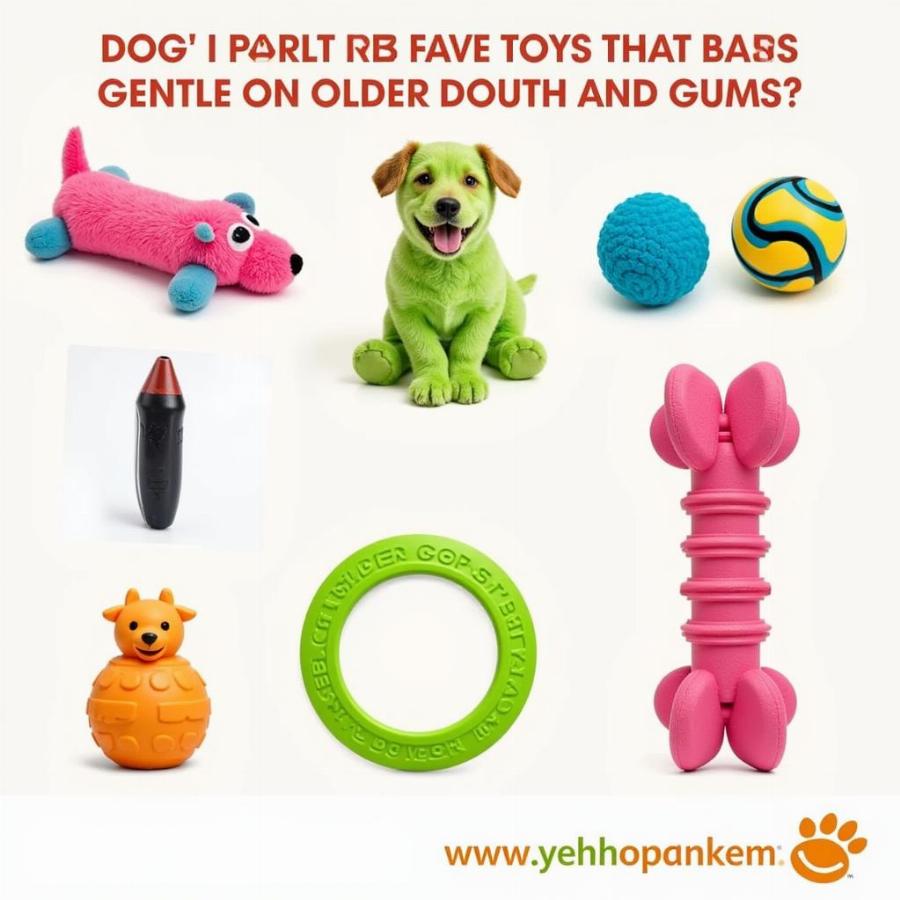Chewies for dogs are more than just fun toys; they’re essential for a dog’s overall well-being. From teething puppies to senior dogs, a good chew can help with everything from dental health to boredom relief. Choosing the right chew, however, can be a daunting task with the sheer variety available. This guide will explore everything you need to know about chewies for dogs, helping you make informed decisions to keep your furry friend happy and healthy.
Why are Chewies Important for Dogs?
Chewing is a natural instinct for dogs. It’s how they explore the world, relieve stress, and maintain healthy teeth and gums. Providing appropriate chew toys can prevent destructive chewing on furniture and other household items. Plus, the act of chewing releases endorphins, which have calming and mood-boosting effects. For puppies, chewies are crucial for soothing sore gums during teething.
Choosing the Right Chew: Size and Durability Matter
Selecting the appropriate chew toy depends on your dog’s size, age, and chewing habits. A small chew toy can be a choking hazard for a large dog, while a chew that’s too hard can damage a puppy’s developing teeth. For aggressive chewers, durable chewies made from tough materials like nylon or rubber are recommended. Always supervise your dog with any new chew toy.
Types of Chewies: From Natural to Synthetic
The market offers a wide variety of chewies, each with its own pros and cons. Natural chewies like bully sticks, rawhide, and antlers are popular choices, but they can pose choking hazards or cause digestive upset if swallowed in large pieces. Synthetic chewies made from nylon, rubber, or silicone are often more durable and come in various shapes and sizes.
Dental Chewies: Promoting Oral Hygiene
Dental chewies are specifically designed to promote oral health. They often have textured surfaces or added ingredients that help clean teeth and freshen breath. Some dental chewies are even infused with flavors like mint or peanut butter to make them more appealing to dogs.
What about Edible Chewies?
Edible chewies, like those made from dried sweet potato or yak cheese, offer a tasty and digestible option. However, it’s important to choose high-quality edible chewies and monitor your dog’s intake to avoid weight gain. Always check the ingredients list to ensure the chew is free of harmful additives or allergens.
Chew Toys for Puppies: Soothing Teething Pain
Teething puppies require soft, pliable chew toys that can soothe their sore gums. Rubber toys filled with water and frozen can provide additional relief. Avoid giving puppies hard chewies that can damage their delicate teeth.
Chew Toys for Senior Dogs: Gentle on Aging Jaws
Senior dogs may have weakened jaws or missing teeth. Choose softer chew toys made from materials like plush or rubber. These toys should be easy to grip and gentle on their aging mouths.
 Soft chew toys for senior dogs with aging jaws
Soft chew toys for senior dogs with aging jaws
How to Keep Chewies Clean and Safe
Regularly inspect your dog’s chewies for signs of wear and tear. Discard any chewies that are broken or pose a choking hazard. Some chewies can be washed with soap and water, while others can be cleaned in the dishwasher.
Are Homemade Chewies a Good Option?
While homemade chewies can be a fun and cost-effective option, it’s important to choose safe and appropriate ingredients. Avoid using cooked bones, which can splinter and cause serious internal injuries. Consult with your veterinarian for safe homemade chew toy recipes.
When to Consult a Vet about Chewing Behavior
Excessive chewing can sometimes be a sign of an underlying medical condition, such as anxiety or dental pain. If your dog’s chewing behavior suddenly changes or seems excessive, consult with your veterinarian.
What are the Best Chew Toys for Aggressive Chewers?
For aggressive chewers, durable chew toys made from materials like nylon or hard rubber are recommended. Look for toys specifically designed for power chewers, as these are typically more resistant to damage.
Conclusion
Choosing the right chewies for your dog is crucial for their physical and mental well-being. By understanding their individual needs and chewing habits, you can provide them with safe and enjoyable chew toys that promote dental health, relieve boredom, and prevent destructive chewing.
FAQ
-
How often should I replace my dog’s chewies? Replace chewies as soon as they show signs of wear and tear or become small enough to be a choking hazard.
-
Can I give my dog cooked bones as chewies? No, cooked bones can splinter and cause serious internal injuries.
-
What are some signs that my dog is chewing excessively? Destructive chewing on furniture or other household items, excessive drooling, or whining while chewing can be signs of excessive chewing.
-
Are rawhide chewies safe for my dog? Rawhide can pose choking hazards or cause digestive upset. Choose high-quality rawhide and supervise your dog while they are chewing.
-
What should I do if my dog swallows a piece of a chew toy? Contact your veterinarian immediately.
-
Are there any chew toys that are completely indestructible? While no chew toy is entirely indestructible, some are significantly more durable than others. Look for toys made from tough materials like nylon or hard rubber.
-
Can I give my dog ice cubes as chewies? While ice cubes can be a refreshing treat, they are not a substitute for proper chew toys.